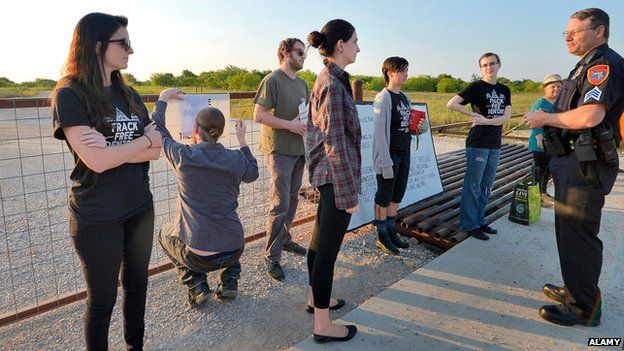The Texas town that banned fracking (and lost)
- Published

When a Texas town voted to ban fracking inside city limits, it was a shock to the oil-friendly state. But the response from the Texas legislature and energy firm has residents questioning what power they have left.
The hydraulic fracturing has started again in Denton, and so too have the protests.
Months ago, the town became the first in Texas to ban hydraulic fracturing, or fracking, in their area.
Fracking is a method of shale gas extraction that uses large amounts of water pumped at high pressure into channels drilled into rock to release gas.
It has been a boon for US energy production and the focus of major protest from environmental groups
But while this part of Texas is no stranger to oil, the fight back against fracking was driven by extreme proximity.
"There are nearly 300 wells in the city limits of Denton, but this neighbourhood was sandwiched by two gas well pad sites," says Dr Adam Briggle, a Denton resident and an environmental studies professor at University of North Texas.
"It was when people saw this and how close to homes they were drilling that we realised we had to look after each other here."
Campaigners turned to the ballot box. They received the required signatures to put a town-wide fracking ban to a vote and took on powerful Texas energy companies.
"They threw everything at us, but the harder they worked to turn it into a knock-down political fight, the more it turned against them," Dr Briggle says.
In November of last year, Denton voted overwhelmingly to ban fracking, and the drilling stopped immediately.
"It felt like vindication, an indication that grassroots democracy can still work in this country," Dr Briggle says.
Not everyone thought so. The very next day, two lawsuits were filed in Austin, the Texas capital.
"What was at stake here were the rights of those families, mineral owners, that were being denied access to their property which is protected under the US constitution," says Todd Staples, President of the Texas Oil and Gas Association.
"Our operators were very willing to work to find solutions, but the path that Denton took was unsustainable," he says.
Mr Staples has been one of those lobbying not only to overturn the ban in Denton, but also to ensure such a ban never happens again anywhere in Texas.
And he has gotten what he wanted. In May, the state passed a bill that in essence, prohibits bans on fracking.
Fracking has undoubtedly revolutionised the energy industry here.
But there are questions about the environmental impact and the nuisance of drilling sites near residential areas. It's what moved Denton residents to act.
At a site on a hill just outside the town, a tall barricade has been erected.
This is the site where fracking was about to begin in November 2014, just as Denton voted for the ban. Just days after it was overturned, trucks and heavy machinery are rolling back in.
As we spoke to residents, it was clear many were not opposed in principle to fracking, but just the way it had been done in their town.
"I'm not totally against fracking, I just think they should give more thought and consideration to people already there," says a woman who didn't want to give her name, but who is one of the closest neighbours to the new fracking site.
There's also a feeling that both the energy companies and politicians who had supported fracking behaved arrogantly.
"People are trying to frame us as being crazy environmentalists," says Dwight Jillik, who lives close to a fracking site with his wife and two young children. "But this issue rallied this community in a way that has nothing to do with left, right or moderate views."
Jillik says the companies just didn't "give a damn".
"No one ever returned our calls or answered our letters about our concerns about fracking."
Texas is a state with a reputation for supporting local control. Many Denton residents are angry the fracking has resumed, despite their vote.
Mr Staples argues the vote to ban fracking in Denton was motivated by scaremongering.
Science Editor David Shukman explains the process of fracking
"The opponents of the oil and gas industry were providing information that water quality was damaged, air quality was damaged and gave misinformation about what was occurring," he says.
But even for many of those with environmental concerns, like Dr Adam Briggle, there is now a new dimension to their outrage over what has happened in Denton.
"I think the biggest point now is not what the rules are, but who gets to make them," Dr Briggle says, adding the new law strips Texas communities of their power.
Soon after we spoke to him, Adam Briggle was arrested for blocking an entrance to a fracking site.
He has now been released, but admits that it is hard to see what avenues are now available to him and others who do not want fracking near their homes.
- Published26 October 2022
- Published31 October 2014